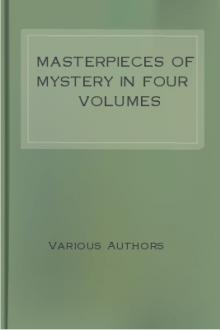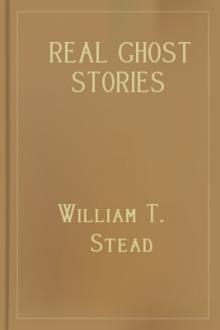Varney the Vampire; Or, the Feast of Blood by Prest and Rymer (ereader iphone .txt) 📗

- Author: Prest and Rymer
Book online «Varney the Vampire; Or, the Feast of Blood by Prest and Rymer (ereader iphone .txt) 📗». Author Prest and Rymer
"I see," said Holland.
"Well, this man, Montgomery, had always some kind of suspicion that Varney would murder him."
"Murder him! and be the means of saving his life; surely he could not be so bad as that."
"Why, you see, sir, this hangman drew a heavy sum yearly from him; thus making him only a mine of wealth to himself; this, no doubt, would rankle in the other's heart, to think he should be so beset, and hold life upon such terms."
"I see, now."
"Yes; and then came the consideration that he did not do it from any good motive, merely a selfish one, and he was consequently under no obligation to him for what he had done; besides, self-preservation might urge him on, and tell him to do the deed.
"However that may be, Montgomery dreaded it, and was resolved to punish the deed if he could not prevent it. He, therefore, left general orders with his wife, whenever he went on a journey to Varney, if he should be gone beyond a certain time, she was to open a certain drawer, and take out a sealed packet to the magistrate at the chief office, who would attend to it.
"He has been missing, and his wife did as she was desired, and now we have found what he there mentioned to be true; but, now, sir, I have satisfied you and explained to you why we intruded upon you, we must now leave and seek for him elsewhere."
"It is most extraordinary, and that is the reason why his complexion is so singular."
"Very likely."
They poured out some wine, which was handed to the officers, who drank and then quitted the house, leaving the inmates in a state of stupefaction, from surprise and amazement at what they had heard from the officers.
There was a strange feeling came over them when they recollected the many occurrences they had witnessed, and even the explanation of the officers; it seemed as if some mist had enveloped objects and rendered them indistinct, but which was fast rising, and they were becoming plainer and more distinct every moment in which they were regarded.
There was a long pause, and Flora was about to speak, when suddenly there came the sound of a footstep across the garden. It was slow but unsteady, and paused between whiles until it came close beneath the windows. They remained silent, and then some one was heard to climb up the rails of the veranda, and then the curtains were thrust aside, but not till after the person outside had paused to ascertain who was there.
Then the curtains were opened, and the visage of Sir Francis Varney appeared, much altered; in fact, completely worn and exhausted.
It was useless to deny it, but he looked ghastly—terrific; his singular visage was as pallid as death; his eyes almost protruding, his mouth opened, and his breathing short, and laboured in the extreme.
He climbed over with much difficulty, and staggered into the room, and would have spoken, but he could not; befell senseless upon the floor, utterly exhausted and motionless.
There was a long pause, and each one present looked at each other, and then they gazed upon the inanimate body of Sir Francis Varney, which lay supine and senseless in the middle of the floor.
The importance of the document, said to be on the dead body, was such that it would admit of no delay before it was obtained, and the party determined that it should be commenced instanter. Lost time would be an object to them; too much haste could hardly be made; and now came the question of, "should it be to-night, or not?"
"Certainly," said Henry Bannerworth; "the sooner we can get it, the sooner all doubt and distress will be at an end; and, considering the turn of events, that will be desirable for all our sakes; besides, we know not what unlucky accident may happen to deprive us of what is so necessary."
"There can be none," said Mr. Chillingworth; "but there is this to be said, this has been such an eventful history, that I cannot say what might or what might not happen."
"We may as well go this very night," said Charles Holland. "I give my vote for an immediate exhumation of the body. The night is somewhat stormy, but nothing more; the moon is up, and there will be plenty of light."
"And rain," said the doctor.
"Little or none," said Charles Holland. "A few gusts of wind now and then drive a few heavy plashes of rain against the windows, and that gives a fearful sound, which is, in fret, nothing, when you have to encounter it; but you will go, doctor?"
"Yes, most certainly. We must have some tools."
"Those may be had from the garden," said Henry. "Tools for the exhumation, you mean?"
"Yes; pickaxe, mattocks, and a crowbar; a lantern, and so forth," said the doctor. "You see I am at home in this; the fact is, I have had more than one affair of this kind on my hands before now, and whilst a student I have had more than one adventure of a strange character."
"I dare say, doctor," said Charles Holland, "you have some sad pranks to answer for; you don't think of it then, only when you find them accumulated in a heap, so that you shall not be able to escape them; because they come over your senses when you sleep at night."
"No, no," said Chillingworth; "you are mistaken in that. I have long since settled all my accounts of that nature; besides, I never took a dead body out of a grave but in the name of science, and never for my own profit, seeing I never sold one in my life, or got anything by it."
"That is not the fact," said Henry; "you know, doctor, you improved your own talents and knowledge."
"Yes, yes; I did."
"Well, but you profited by such improvements?"
"Well, granted, I did. How much more did the public not benefit then," said the doctor, with a smile.
"Ah, well, we won't argue the question," said Charles; "only it strikes me that the doctor could never have been a doctor if he had not determined upon following a profession."
"There may be a little truth in that," said Chillingworth; "but now we had better quit the house, and make the best of our way to the spot where the unfortunate man lies buried in his unhallowed grave."
"Come with me into the garden," said Henry Bannerworth; "we shall there be able to suit ourselves to what is required. I have a couple of lanterns."
"One is enough," said Chillingworth; "we had better not burden ourselves more than we are obliged to do; and we shall find enough to do with the tools."
"Yes, they are not light; and the distance is by far too great to make walking agreeable and easy; the wind blows strong, and the rain appears to be coming up afresh, and, by the time we have done, we shall find the ground will become slippy, and bad for walking."
"Can we have a conveyance?"
"No, no," said the doctor; "we could, but we must trouble the turnpike man; besides, there is a shorter way across some fields, which will be better and safer."
"Well, well," said Charles Holland; "I do not mind which way it is, as long as you are satisfied yourselves. The horse and cart would have settled it all better, and done it quicker, besides carrying the tools."
"Very true, very true," said the doctor; "all that is not without its weight, and you shall choose which way you would have it done; for my part, I am persuaded the expedition on foot is to be preferred for two reasons."
"And what are they?"
"The first is, we cannot obtain a horse and cart without giving some detail as to what you want it for, which is awkward, on account of the hour. Moreover, you could not get one at this moment in time."
"That ought to settle the argument," said Henry Bannerworth; "an impossibility, under the circumstances, at once is a clincher, and one that may be allowed to have some weight."
"You may say that," said Charles.
"Besides which, you must go a greater distance, and that, too, along the main road, which is objectionable."
"Then we are agreed," said Charles Holland, "and the sooner we are off the better; the night grows more and more gloomy every hour, and more inclement."
"It will serve our purpose the better," said Chillingworth. "What we do, we may as well do now."
"Come with me to the garden," said Henry, "and we will take the tools. We can go out the back way; that will preclude any





Comments (0)